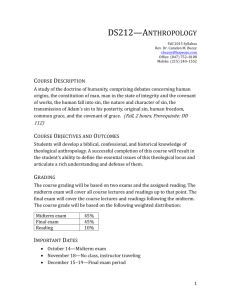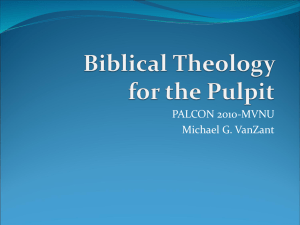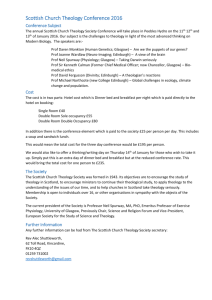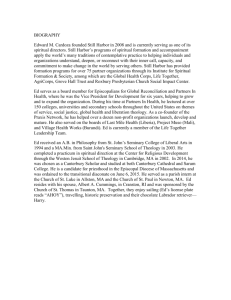ST 101 – Introduction to Systematic Theology
advertisement
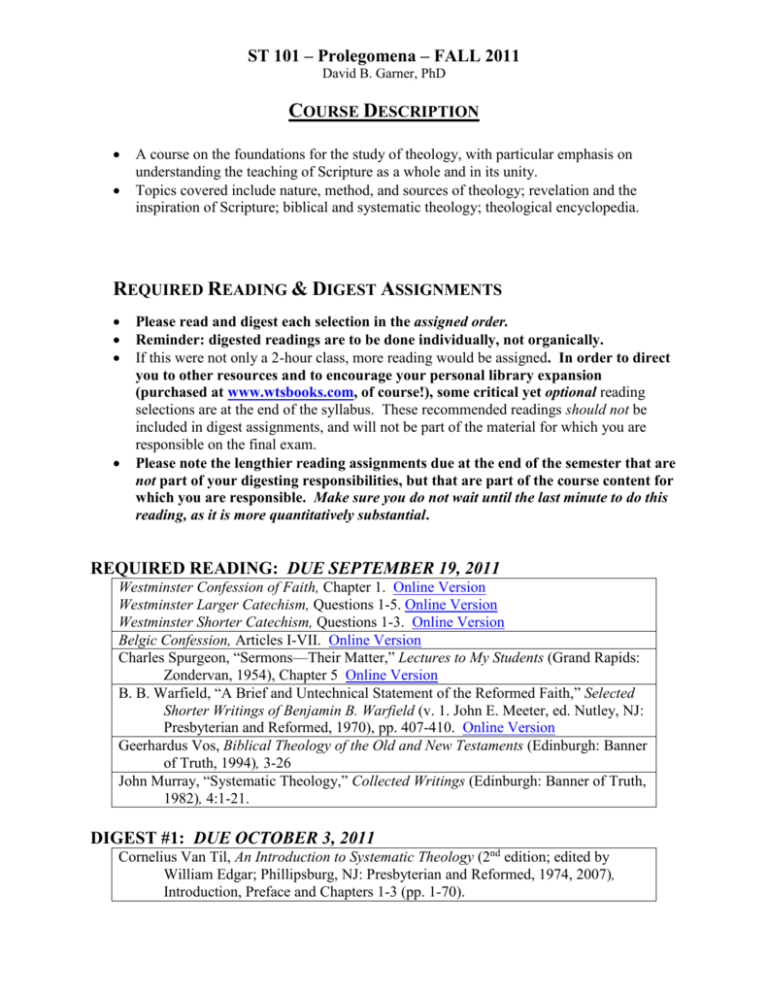
ST 101 – Prolegomena – FALL 2011 David B. Garner, PhD COURSE DESCRIPTION A course on the foundations for the study of theology, with particular emphasis on understanding the teaching of Scripture as a whole and in its unity. Topics covered include nature, method, and sources of theology; revelation and the inspiration of Scripture; biblical and systematic theology; theological encyclopedia. REQUIRED READING & DIGEST ASSIGNMENTS Please read and digest each selection in the assigned order. Reminder: digested readings are to be done individually, not organically. If this were not only a 2-hour class, more reading would be assigned. In order to direct you to other resources and to encourage your personal library expansion (purchased at www.wtsbooks.com, of course!), some critical yet optional reading selections are at the end of the syllabus. These recommended readings should not be included in digest assignments, and will not be part of the material for which you are responsible on the final exam. Please note the lengthier reading assignments due at the end of the semester that are not part of your digesting responsibilities, but that are part of the course content for which you are responsible. Make sure you do not wait until the last minute to do this reading, as it is more quantitatively substantial. REQUIRED READING: DUE SEPTEMBER 19, 2011 Westminster Confession of Faith, Chapter 1. Online Version Westminster Larger Catechism, Questions 1-5. Online Version Westminster Shorter Catechism, Questions 1-3. Online Version Belgic Confession, Articles I-VII. Online Version Charles Spurgeon, “Sermons—Their Matter,” Lectures to My Students (Grand Rapids: Zondervan, 1954), Chapter 5 Online Version B. B. Warfield, “A Brief and Untechnical Statement of the Reformed Faith,” Selected Shorter Writings of Benjamin B. Warfield (v. 1. John E. Meeter, ed. Nutley, NJ: Presbyterian and Reformed, 1970), pp. 407-410. Online Version Geerhardus Vos, Biblical Theology of the Old and New Testaments (Edinburgh: Banner of Truth, 1994), 3-26 John Murray, “Systematic Theology,” Collected Writings (Edinburgh: Banner of Truth, 1982), 4:1-21. DIGEST #1: DUE OCTOBER 3, 2011 Cornelius Van Til, An Introduction to Systematic Theology (2nd edition; edited by William Edgar; Phillipsburg, NJ: Presbyterian and Reformed, 1974, 2007), Introduction, Preface and Chapters 1-3 (pp. 1-70). ST 101 – Prolegomena Fall 2011, Dr. Garner Page 2 of 7 PLEASE READ ALL the assigned pages; DIGEST ONLY chapters 1-3 (pp. 15-70) John Calvin, Institutes of the Christian Religion (trans. and ed. by Ford Lewis Battles; ed. by John T. McNeill; The Library of Christian Classics Volumes XX-XI; Philadelphia: Westminster Press, 1940), I.i-ix [Book 1, Chapters 1-9] Cornelius Van Til in Ned Stonehouse, ed., The Infallible Word: A Symposium (Philadelphia: Presbyterian Guard, 1946), 263-283, 295-301. PDF version G. C. Berkouwer, General Revelation (Studies in Dogmatics; Grand Rapids: Eerdmans, 1955), 285-332. DIGEST #2: DUE OCTOBER 24, 2011 Herman Bavinck, Reformed Dogmatics (ed. by John Bolt; transl. by John Vriend; Grand Rapids: Baker, 2003), 1:353-85 B. B. Warfield, The Inspiration and Authority of the Bible (Phillipsburg, NJ: Presbyterian and Reformed, 1948), “The Biblical Idea of Revelation” (pp. 71102) B. B. Warfield, The Inspiration and Authority of the Bible, “The Biblical Idea of Inspiration” (pp. 131-166) John Murray in Ned Stonehouse, ed., The Infallible Word: A Symposium (Philadelphia: Presbyterian Guard, 1946), 1-54 Sinclair Ferguson in Harvey Conn, ed., Inerrancy and Hermeneutic (Grand Rapids: Baker, 1988), 47-66 Digest #3: DUE NOVEMBER 14, 2011 E. J. Young, Thy Word is Truth (Edinburgh: Banner of Truth, 1957), Chapter 5 (113138) N. K. Weeks, The Sufficiency of Scripture (Edinburgh: Banner of Truth: 1988), Chapters 1-6 (pp. 3-36) John Frame, The Doctrine of the Word of God (Phillipsburg, NJ: Presbyterian and Reformed, 2010), Chapters 12-23 (pp. 71-144) Karl Barth, Church Dogmatics, I/1: The Doctrine of the Word of God (ed. by Thomas Torrance; transl. and ed. by Geoffrey Bromiley; T & T Clark, 2004): pp. 111140; Online version also at Google Books Richard Gaffin, Perspectives on Pentecost (Phillipsburg, NJ: Presbyterian and Reformed, 1979), 89-116. John Murray, Collected Writings (Edinburgh: Banner of Truth, 1976), 1:186-89 REQUIRED READING: DUE DECEMBER 2, 2011 Westminster Confession of Faith, Chapters 1-33 [The goal of this reading is to appreciate the flow and development in the Confession of Faith itself. It would be best to do this particular reading in one sitting. While you are responsible to read the entire confession – even if you have done so many times before, for this course you will be responsible only for the content of chapter 1, “Of the Holy Scripture.”] Online Version Richard B. Gaffin, Jr., God's Word in Servant-Form: Abraham Kuyper and Herman ST 101 – Prolegomena Fall 2011, Dr. Garner Page 3 of 7 Bavinck on the Doctrine of Scripture (Jackson, MS: Reformed Academic Press, 2008). Read entire book Richard A. Muller, The Study of Theology. Edited by Moises Silva, Volume 6 in Foundations of Contemporary Interpretation; Grand Rapids: Zondervan, 1991. Entire Book (This is pp. 533-666 in this edition which is six volumes bound as one). Geerhardus Vos, “The Idea of Biblical Theology as a Science and as a Theological Discipline” (Inaugural Lecture, Princeton Theological Seminary, May 8, 1894), http://www.biblicaltheology.org/ibt.pdf ADDITIONAL READING Theology Herman Bavinck, Our Reasonable Faith (trans. by Henry Zylstra; Grand Rapids: Baker, 1977), 17-31 Richard A. Muller, Post-Reformation Reformed Dogmatics, 1:149-220 Louis Berkhof, Introduction to Systematic Theology, 93-143 John Frame, The Doctrine of the Knowledge of God, 1-100 Abraham Kuyper, Principles of Sacred Theology, 228-340 E. J. Young, Thy Word is Truth, 187-208 Revelation Herman Bavinck, Our Reasonable Faith (trans. by Henry Zylstra; Grand Rapids: Baker, 1977), 32-94 Herman Bavinck, Reformed Dogmatics (ed. by John Bolt; transl. by John Vriend; Grand Rapids: Baker, 2003), 1:323-51 J. van Genderen & W. H. Velema, Concise Reformed Dogmatics, 20-57 B. A. Damarest, General Revelation Paul Helm, The Divine Revelation, 1-18 Abraham Kuyper, Principles of Sacred Theology, 341-405 Leon Morris, I Believe in Revelation Bavinck, Philosophy of Revelation, 1-315 D. L. Migliore, Faith Seeking Understanding, 2nd Edition, 39-63 [Neo-orthodox] Scott Oliphint, “Bavinck’s Realism, the Logos Principle, and Sola Scriptura,” WTJ Fall 2010. (http://mysite.verizon.net/oliphint/Writings/Bavinck%20epistemology%20WTJ.html Scripture Francis Turretin, Institutes of Elenctic Theology, 1:55-168. A classic, influential and still valuable Reformed treatment of Scripture. ST 101 – Prolegomena Fall 2011, Dr. Garner Page 4 of 7 B. B. Warfield, The Inspiration and Authority of the Bible, 245-296. This classic essay remains the definitive etymological treatment of theopneustos. Herman Bavinck, Reformed Dogmatics (ed. by John Bolt; transl. by John Vriend; Grand Rapids: Baker, 2003), 1:389-494. Robert Letham, The Westminster Assembly: Reading Its Theology in Its Historical Context, 120158. Letham puts chapter 1 of the Confession in its historical context. A useful and important contribution. G. K. Beale, The Erosion of Inerrancy in Evangelicalism: Responding to New Challenges to Biblical Authority. This work is a compilation of interactions by Greg Beale with Peter Enns’ treatment of Scripture. Louis Berkhof, Introduction to Systematic Theology, 144-169. Berkhof remains a staple in Reformed dogmatics. B. A. Gerrish, “Biblical Authority and the Continental Reformation,” Scottish Journal of Theology 10 (1957). 337-360 J. van Genderen & W. H. Velema, Concise Reformed Dogmatics, 58-116. Abraham Kuyper, Principles of Sacred Theology, 405-563. John D. Morrison, “Scripture as Word of God: Evangelical Assumption or Evangelical Question?”, Trinity Journal 20:2 (Fall 1999): 165-190. J. I. Packer, “John Calvin and the Inerrancy of Holy Scripture,” in Inerrancy and the Church, ed. John D. Hannah (Chicago: Moody, 1984): 143-188. Stephen J. Nichols and Eric T. Brandt. Ancient Word, Changing World: The Doctrine of Scripture in a Modern Age (Wheaton: Crossway, 2009). Timothy Ward. Words of Life: Scripture as the Living and Active Word of God. Downers Grove: InterVarsity, 2009. This fresh treatment of Scripture as the living Word of God is a solid, evangelical exposition; however, the author’s over-reliance upon speech-act theory compromises its otherwise solid content. Revelation and Cessationism Wayne Grudem, editors. Are Miraculous Gifts for Today? Four Views (Grand Rapids: Zondervan, 1996). In this Counterpoint series, Richard B. Gaffin presents the cessationist position; O. Palmer Robertson, The Final Word: A Biblical Response to the Case for Tongues and Prophecy Today (Edinburgh: Banner of Truth, 1993). See also, http://www.thehighway.com/tongues_Robertson.html. Vern Poythress, “Modern Spiritual Gifts as Analagous to Apostolic Gifts: Affirming Extraordinary Works of the Spirit within Cessationist Theology,” JETS 39, 1 (1996): 71101. Attempting to uphold the unqualified character of divine revelation and its completion in Christ, Poythress navigates a via media between Grudem’s qualified prophecy and historic cessationism. Garrett Howard Milne. The Westminster Confession of Faith and the Cessation of Special Revelation: The Majority Puritan Viewpoint on Whether Extra-Biblical Prophecy is Still Possible. Eugene, OR: Wipf and Stock, 2007. ST 101 – Prolegomena Fall 2011, Dr. Garner Page 5 of 7 R. Fowler White, “Richard Gaffin and Wayne Grudem on 1 Cor 13:10: A Comparison of Cessationist and Noncessationist Argumentation,” JETS 35/2 (June 1992): 173-181. R. Fowler White, “Does God Speak Today Apart from the Bible?” in The Coming Evangelical Crisis, ed. John H. Armstrong (Chicago: Moody, 1996), 77-90 Systematic Theology and Biblical Theology Herman Bavinck, Reformed Dogmatics, 1:115-204 Richard B. Gaffin, Jr., “Biblical Theology and the Westminster Standards,” in Peter A. Lillback, ed., The Practical Calvinist, 425-442 Richard B. Gaffin, Jr., “Systematic Theology and Biblical Theology,” in J. H. Skilton, ed., The New Testament Student and Theology, 32-50; http://www.beginningwithmoses.org/articles/gaffinstandbt.htm B. B. Warfield, “The Indispensableness of Systematic Theology to the Preacher,” Selected Shorter Writings, 2:280-288 D. A. Carson. “Systematic Theology and Biblical Theology” in New Dictionary of Biblical Theology, eds. T. D. Alexander and Brian S. Rosner (Leicester: Inter-Varsity Press and Downers Grove: InterVarsity Press, 2000), pp. 89-104. Lee Irons, “Biblical Theology and Systematic Theology: A Digest of Reformed Opinion on Their Proper Relationship,” http://www.upper-register.com/papers/bt_st.html Richard Lints, "Two Theologies or One? Warfield and Vos on the Nature of Theology," Westminster Theological Journal 54 (1992), 235-253. Vern Poythress, “Kinds of Biblical Theology,” Westminster Theological Journal [WTJ] 70/1 (2008), 129-42; http://www.frame-poythress.org/poythress_articles/2008Kinds.htm Doriani, Daniel M. “A Redemptive-Historical Model,” in Stanley N. Gundry, ed., Four Views on Moving Beyond the Bible to Theology. Neil B. MacDonald, Metaphysics and the God of Israel (Grand Rapids: Baker, 2006). Though MacDonald is Barthian, his attempt to show the inseparability of BT and ST is commendable. This is a fine work of philosophical theology, which honors both ontology and history with dexterity. Theological Encyclopedia Kuyper, Principles of Sacred Theology, trans. by DeVries (New York: Scribner, 1898; reprint Grand Rapids: Baker, 1980), 1-23. This is a classic treatment of the encyclopedia. Philip Schaff, Theological Propaedeutic: A General Introduction to the Study of Theology, Exegetical, Historical, Systematic, and Practical (New York: Scribner, 1984). Gerhard Ebeling, The Study of Theology (trans. by Duane Priebe; Philadelphia: Fortress, 1978). Ebeling’s thesis is that the tensions between the disciplines are insurmountable in the modern age, and though he suggests some possible advances, one is left without a great deal of hope. Nonetheless, his work provides a good survey of the presenting and underlying complications. ST 101 – Prolegomena Fall 2011, Dr. Garner Page 6 of 7 Edward Farley, Theologia: The Fragmentation and Unity of Theological Education (Philadelphia: Fortress, 1983). Farley offers an essentially subjectivist, and might I add, essentially dissatisfactory solution to the crisis of fractionalized theological disciplines. ST 101 – Prolegomena – FALL 2011 David B. Garner, PhD




